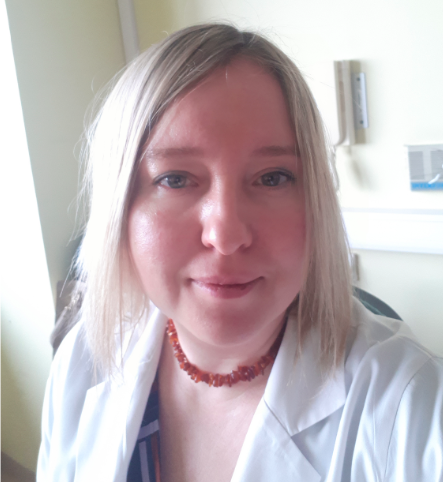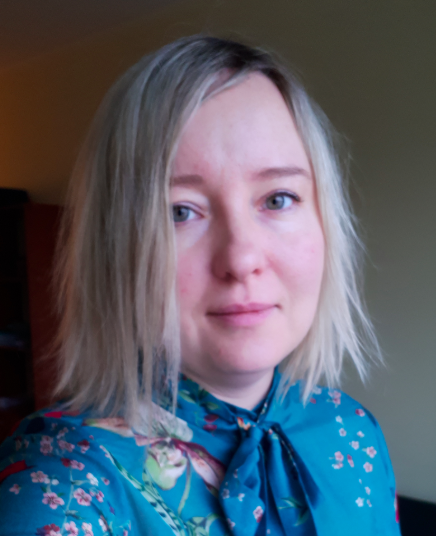Alicja Heyda answers the question:
What is the nicest thing a non-family member has ever done for you?
 It took me a little time to think what kind of nice experience was most important for me in my life. I was a weird child who was a crazy scientist. I was reading everything since I was four, including fairy tales, encyclopedias, scientific books, novels for grownups. So I was told, "Stop being so grown up, you are like a little old... Stop asking all these questions. What experiments are you doing over there?"
It took me a little time to think what kind of nice experience was most important for me in my life. I was a weird child who was a crazy scientist. I was reading everything since I was four, including fairy tales, encyclopedias, scientific books, novels for grownups. So I was told, "Stop being so grown up, you are like a little old... Stop asking all these questions. What experiments are you doing over there?"
And as a kindergarten child, I was conducting research: is it possible to enter the world of fairies. Later I had a little microscope, so I was searching for various answers, observing the world. But I wasn't really accepted and it was difficult to feel well in my classroom, to have friends. So I was often rejected or people laughed in my face.
And when I became a teenager, when I was 13 years old, I was really desperate and very sad because my mind was, as always, a mind of a crazy little scientist, but still I wasn't fitting in. And then we received a new school tutor; he took care of our class. In Poland, every class has its tutor. And it was a physicist, a young person, right after completing his studies. And he was very observant. He looked at us, he kept talking to each of us, taking care of us. And once in a while he said, "Please don't stop being yourself. It is wonderful when you seek for the knowledge, when you seek for experience that is out of the school program... it's not an expected program, and you are reaching with your mind far away. But you are daring to dream or have ideas, fantasies. It is you and you should remind yourself."
And that was a breakthrough. I received acceptance from a person who was a grownup, a man. And this grownup person didn't tell me, "Stop talking. Stop researching. Stop fantasizing. Stop creating ideas and stories in your head." And that's why I kept on being myself without being so depressed. And that was the beginning of a long journey, searching for philosophy, meditation, bodywork.
Two years later, the first bodywork book was published in Poland, and I bought it and I knew this is something, this is the thing I should really study and do in my future. So I was able to live without being desperate after this one strong act of acceptance. I believe this is one of the most important stories of supporting the children without being focused on their gender, social convention, usual behavior. It was really brilliant and out of its time. It was 1988, the end of communism in Poland. We had no internet. Food was lacking sometimes. Everybody kept on standing in long queues for everything. But his mind was open and very, very compassionate, and I think everybody should take an example.
When I was thinking about his powerful presence and his support, and you should be aware that it was 1988 and it was the end of communistic times, we were supposed not to think freely, not to be independent, not to search for the answers. The totalitarian systems have the answer to anything. So if someone is thinking independently, this is a dangerous person.
So what he did was out of the system and it was very supportive for my future independence of research and a meditative process and helping others. So, you should be aware that during communistic times, we even had special songs praising the system, or we had to learn Russian instead of English. All these things were very difficult, so independent thought was hidden. All process of psychotherapy also gives people freedom. Modern philosophy and meditation groups, like Buddhist groups in Poland, it was all a bit hidden or it was monitored by the people in power. So what he did was very nice, brave, and powerful. And a year later, the communistic system collapsed. And that was the end of this totalitarian story in Poland. Thank you.
 Alicja Heyda, PhD, is a psychotherapist, clinical psychologist, psycho-oncologist, certified breathwork practitioner, and researcher. She's been passionate about breathwork and meditation since she was a teen.
Alicja Heyda, PhD, is a psychotherapist, clinical psychologist, psycho-oncologist, certified breathwork practitioner, and researcher. She's been passionate about breathwork and meditation since she was a teen.
After studying body psychotherapy, breathwork, mindfulness, and process-oriented psychology for many years, she describes her work as integrative breathwork psychotherapy.
For nearly 20 years, she's been helping mental health and cancer patients, teaching them how to immediately reduce anxiety, phobias, depression, and pain, and how to heal trauma and support immunity with bodywork, breathwork, and awareness.
Catalyst is produced by The Shift Network to feature inspiring stories and provide information to help shift consciousness and take practical action. To receive Catalyst twice a month, sign up here.
This article appears in: 2020 Catalyst, Issue 6: The Breathwork Summit



